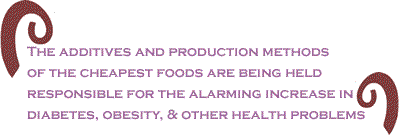|
World
Food Day has come and gone this month and not many noticed
that nearly 1 billion are hungry around the world.
The
day is observed each year on October 16 and, this year,
as usual, most Americans went about their business - including
eating two or three complete meals - without too much thought
about the people who are hungry.

Many
of the hungry are children and there have been some stories
about hunger or “food insecurity,” a euphemism that means
generally that one doesn’t know what one is going to eat
for the next meal or if one is going to eat a next
meal.
Usually,
it takes a special day, like Oct. 16, to get a subject like
hunger talked or written about in the American press. Earlier
this year, it was reported that the numbers of the hungry
are increasing, the recession is making it worse, and the
percentages are alarming: Feeding America (FA) issued “Hunger
in America 2010,” the largest study of domestic hunger,
drawing on data from more than 61,000 interviews with their
members’ clients, as well as surveys of 37,000 feeding agencies.
FA
is a non-profit food broker (it used to be called Second
Harvest) that negotiates with giant food corporations and
others for food that is surplus or leftover or not sent
to retail stores for some other reason, and it provides
that food for shelters, food pantries, and other (usually
volunteer) outlets that distribute food to the hungry.
FA
reported in 2010 that it is providing food to 37 million
Americans, including 14 million children, an increase of
46 percent over 2006. What is generally not known is that,
in 36 percent of the homes receiving food from the member
pantries, at least one adult is working.
 Here’s
a general definition of what we’re talking about, from the
Food and Research Action Center,
just this month: “Very simply, hunger is defined as the
uneasy or painful sensation caused by lack of food. When
we talk about hunger in America, we refer to the ability of people to
obtain sufficient food for their household. Some people
may find themselves skipping meals or cutting back on the
quality or quantity of food they purchase at the stores.
This recurring and involuntary lack of access to food can
lead to malnutrition over time.” Here’s
a general definition of what we’re talking about, from the
Food and Research Action Center,
just this month: “Very simply, hunger is defined as the
uneasy or painful sensation caused by lack of food. When
we talk about hunger in America, we refer to the ability of people to
obtain sufficient food for their household. Some people
may find themselves skipping meals or cutting back on the
quality or quantity of food they purchase at the stores.
This recurring and involuntary lack of access to food can
lead to malnutrition over time.”
Millions
of American children feel that “uneasy or painful sensation,”
but imagine the hungry children around the world, numbering
in the hundreds of millions. Mainly, it’s because they are
poor - their families are poor. They cannot buy enough food
to stave off hunger and, usually, they don’t see any relief
in the near or distant future.
Socioeconomic
status (SES) has a lot to do with whether one eats well,
grows up healthy, and is able to find a job that can sustain
a family (when there were jobs in America). For example,
in Health
Issues in the Black Community, Braithwaite, Taylor,
and Treadwell wrote: “Socioeconomic status is a major predictor
of dietary intake. Blacks are disproportionately represented
among the low-income segment of the population, and low
SES has been linked to a variety of dietary or nutritional
problems…In 2006, the majority of black persons (55 percent)
lived in families that could be classified as poor or near
poor…”
Also,
in the same book, it was noted, “higher levels of food insecurity
may lead to poorer diet quality and increased calorie consumption.
Energy-dense, but nutrient-poor foods and beverages may
be less expensive and therefore more likely to be available
in households with limited financial resources.”
 It’s
no accident that sickness and disease are prevalent in urban
and rural ghettoes, which other academics have described
as “food deserts,” meaning that the only foods that are
easily available or affordable are fast foods or manufactured
foods that barely resemble the vegetables, grains, and other
products from which they came. In such places, there are
few supermarkets or other places to buy nutrient-dense food
at a reasonable cost. The additives and production methods
of the cheapest foods (these are, after all, “manufactured”
foods) are being held responsible by more and more Americans
for the alarming increase in diabetes, obesity, and other
health problems in recent years. It’s
no accident that sickness and disease are prevalent in urban
and rural ghettoes, which other academics have described
as “food deserts,” meaning that the only foods that are
easily available or affordable are fast foods or manufactured
foods that barely resemble the vegetables, grains, and other
products from which they came. In such places, there are
few supermarkets or other places to buy nutrient-dense food
at a reasonable cost. The additives and production methods
of the cheapest foods (these are, after all, “manufactured”
foods) are being held responsible by more and more Americans
for the alarming increase in diabetes, obesity, and other
health problems in recent years.
But
what are elected officials doing about the problem of hunger,
which exacerbates virtually every other problem (remember,
it is a socioeconomic issue)? Tea Party adherents and others
in the Republican Party are against raising the minimum
wage (in fact, many are against any minimum wage law), they
have voted against extending unemployment benefits to people
who have no prospect of finding a job in the foreseeable
future, they have eliminated the cost of living increase
in Social Security for the past two years, and they are
aiming to chip away at Medicare and Medicaid. The ostensible
reason for no COLA for Social Security is that there is
low inflation, but the increase in gasoline and home heating
oil prices gives the lie to that assertion. And, what’s
worse, the U.S. Department of Agriculture said this week
that food inflation will “accelerate” in the next few months
and into the first half of 2011, especially for dairy products,
meat, and cereals (grain products).
As
for jobs, in this Great Recession, in which the disparity
in wealth is the greatest since the Great Depression of
75 years ago, in the waning days of the Robber Barons, the
jobs that will be available will be at the low end of the
economic scale - what we saw starting about 30 years ago
- not quite enough to pull enough Americans out of the depths
of the recession.

In
other countries around the world, where the global policies
of transnational corporations, the World Bank and International
Monetary Fund, and governments of the “developed” countries
have virtually dictated food policies for billions, they
have been struggling toward “food sovereignty” for several
years.
According
to Joel Greeno, a dairy farmer and member of Family Farm
Defenders in Wisconsin and the National Family Farm Coalition,
“Food sovereignty is about fair trade, international security,
energy independence, all that, but it really starts with
you - where you buy your food, how you take care of your
neighbor. It’s that simple.”
Emulating
peasant and indigenous peoples in “developing countries,”
Americans have launched formation of the U.S. Food Sovereignty
Alliance, seen as a key answer to ending hunger, economic
disparity, and climate change.
The
People’s Movement Assembly on Food Sovereignty, at the Social
Forum 2010 in Detroit, declared, “We find that our work
to build a better food system in the United States is inextricably
linked to the struggle for workers’ rights, immigrant rights,
women’s rights, the fight to dismantle racism in our communities,
and the struggle for sovereignty in indigenous communities.
 We
find that in order to create a better food system, we must
break up the corporate control of our seeds, land, water,
and natural resources.” We
find that in order to create a better food system, we must
break up the corporate control of our seeds, land, water,
and natural resources.”
It’s
a tall order, but it can be done, if we are to eliminate
hunger and all of the related ills of a society that stands
in such economic despair and in which so many are suffering.
In recent weeks, there was at least one story on television
news about people who had been in the $75,000-$200,000 income
bracket who have lost their jobs, their homes, and they
are finding food in their local pantries. To some, this
is an astounding set of events in a country such as America. It shouldn’t
be astounding, except for those who think Americans are
not like other peoples in the world.
Although
some Americans might want to take more direct action, the
UN Food and Agriculture Organization has started a worldwide
petition drive to end hunger. FAO’s theme for World Food
Day this year was “United Against Hunger,” and the petition
can be found at www.1billionhungry.org.
The ills of society are connected to hunger in so many ways.
Signing a petition might not sound like doing enough, but
it’s a good start.
BlackCommentator.com
Columnist, John Funiciello, is a labor organizer and former
union organizer. His union work started when he became a
local president of The Newspaper Guild in the early 1970s.
He was a reporter for 14 years for newspapers in New York State. In
addition to labor work, he is organizing family farmers
as they struggle to stay on the land under enormous pressure
from factory food producers and land developers. Click here
to contact Mr. Funiciello.
|

